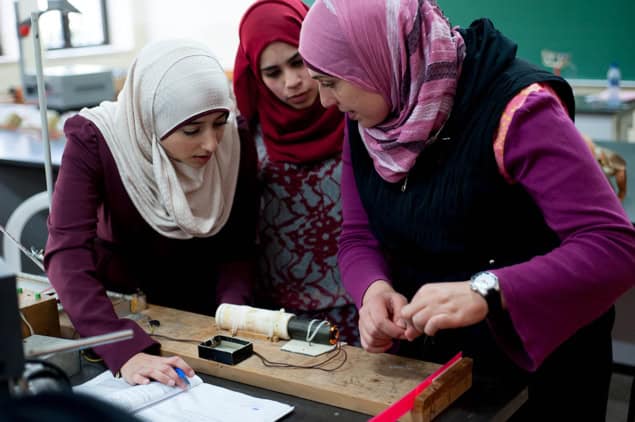With the Middle East in turmoil, Kate Shaw says that we need to provide more support to physicists in the region

This time last year I was just settling into my new office at Birzeit University in the West Bank, Palestine. I spent the winter teaching a master’s course in particle physics alongside my colleague Bobby Acharya from King’s College London. I was supported by my institute – the Abdus Salam International Centre for Theoretical Physics (ICTP) in Trieste in Italy – where I am a postdoctoral fellow working on the ATLAS experiment at CERN.
In the six months I spent in Palestine, I visited three universities in the West Bank – An-Najah, Al-Quds and Birzeit – and three in Gaza – Al-Aqsa University, the Islamic University of Gaza and Al-Azhar University – that all teach undergraduate courses in physics. Palestinians put a high value on education, with about a quarter of the population heading to university – one of the highest figures in the region. While going to university is not cheap, scholarships help the best students to continue their studies. I met academics who, along with lecturing, carried out research in areas such as biophysics, computational nuclear physics and condensed-matter physics.
While the staff were extremely welcoming and students clearly had a love for physics, it was disheartening to see the state of the laboratories and how their spirits were dampened by the state of their equipment – in some cases much of it was broken and there are limited resources available for new apparatus. Yet the technicians were extremely resourceful and much of the working equipment is handmade using a variety of materials.
One of the key issues in Palestine – as in many developing regions – is that lecturers are overloaded with teaching with little time for research. On top of that, lecturers are poorly paid and physics departments are underfunded. Such working conditions will not attract young ambitious physics students to work in physics in Palestine. Those who do go elsewhere for further study will often stay there where they have the facilities to continue their research.
As physics is relatively undersubscribed at universities, it receives less funding than other more subscribed departments. The lack of interest is due to physics being seen to lead exclusively to a career in teaching. Parents often deter their children from taking the subject at university, meaning only the very determined endeavour to go on to study physics at undergraduate level. Universities in Palestine also have little or no access to academic journals.
Palestinian physics departments have additional problems in trying to develop research. Institutions have been closed for a number of periods in the past, and travel – a vital ingredient of an academic career – is not easy. Within the West Bank just getting to university can often be arduous, let alone trying to travel internationally.
The situation is worse in Gaza, with academics and students not being allowed to travel to the West Bank – inhibiting collaboration and preventing shared resources and infrastructure – but on top of that the blockade on Gaza often means academics and students cannot travel at all, and equipment is difficult or impossible to get to the universities. This leaves academics in Palestine isolated. And of course the recent war in Gaza has left universities devastated and without basic things like power.
Supporting cause
For all the bad news, there are some encouraging aspects. Women dominate physics in Palestine, a trend that is seen in other parts of the Middle East. Coming from the UK where only about 20% of undergraduate physics students are female, standing in front of audiences consisting of 60–80% women was remarkable. It seems that Palestine does not struggle to get women to study science.
However, at faculty level things are different – at Birzeit, for example, particle theorist Wafaa Khater, who is head of the physics department, is the only female faculty member. Other departments have similarly few women in senior positions, possibly because women in the region are not expected to forge professional careers. Nevertheless, social norms are changing and there is a bright new generation of ambitious female students pursuing their studies abroad.
Universities must put more value on scientific research, and realize the impact it can have on students, the university and the scientific culture of Palestine
By supporting the development of physics research in Palestine, we can also help women there. Furthermore, in an ever-changing political, social and economic environment, strong institutions engaging in international research are vital, and so too is the production of high-quality scientists. This is especially urgent in the Middle East where the environmental crisis worsens.
I found it inspirational to meet such ambitious bright young students and tenacious academics who endeavour to fulfil their potential in challenging circumstances. But for their research to grow, universities must put more value on scientific research, and realize the impact it can have on students, the university and the scientific culture of Palestine. Lecturers must also have their teaching load eased, and obtain the opportunity to take sabbaticals, to travel to international conferences and institutions for collaboration.
As a scientific community I believe we must support research in Palestine – and in the region generally – by providing internships, master’s and PhD placements for the brightest students as well as collaborating with academics who pursue their research in the face of heavy teaching, poor funding and international isolation. Scientific opportunity simply must be based on merit, not one’s country of birth. Finally, academic journals must become accessible to all, irrespective of their or an institute’s capital. There is a huge untapped potential of scientists in Palestine and throughout the region – and we and our institutes must reach out and collaborate.



